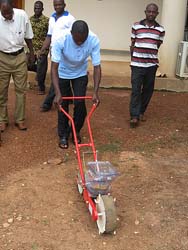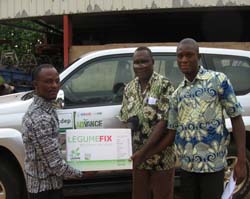In Ghana, the N2Africa project primarily seeks to promote the production and productivity of soyabean, cowpea and groundnut in the northern sector of the country. Various partners engage in establishing demonstration plots evaluating the use of rhizobium inoculants and phosphorus fertilizer (TSP and/or murriate of potash) and in some cases also nitrogen fertilizer (Urea). Also, they establish multi-location variety trials and multi-locational input trials with different types of fertilizers (organic and inorganic) of the three target legumes.
The Agricultural Development and Value Chain Enhancement (ADVANCE) Program partnered with N2Africa in 2011. ADVANCE is a USAID-funded project with the goal to achieve a greater degree of food security among the rural population in northern Ghana while increasing competitiveness in the domestic markets. Therefore the program adopts a value chain approach where smallholder farmers are linked to markets, finance, inputs and equipment services and information through relatively larger nucleus (commercial) farmers and large traders (aggregators) who have the capacity to invest in these chains. The program also builds the capacity of smallholder farmers to increase the efficiency of their farm business with improved production and post-harvest handling practices. In addition, the ADVANCE project has been collaborating with input supply companies interested in investing in on-farm demonstrations as a way of educating smallholder farmers on new technologies.
|
|
Left: ADVANCE staff taking delivery of inoculants (Legumefix) at CSIR-SARI for distribution to agro-input dealers and nucleus farmers Right: Testing whether a simple planter could sow inoculated seed without removing the inoculants from the seed surface
|
 |
The partnership with ADVANCE started off with a workshop in May 2011, where N2Africa staff, led by Rev-Dr. Benjamin Ahiabor, trained the staff of ADVANCE and some agro-input dealers on rhizobium technology and legume enterprise. After half a year, all the nucleus farmers reported of positive responses of their cultivated soyabean to rhizobium inoculation. Based upon that positive reaction, in May 2012, ADVANCE continued to train 18 of its Nucleus Farmers as well as four (4) extension personnel of ADVANCE on soyabean-inoculants technology. These nucleus farmers were expected to also disseminate the technology to their out-grower farmers.
The N2Africa project’s partnership with ADVANCE has tremendously advanced the cause of the project in the target zone. In northern Ghana, ADVANCE is now working with 48,648 farmers, 478 producer, trade and business associations, 112 nucleus farmers with out-grower schemes, 106 large end-buyers/processors, 131 agro-input dealers, 46 financial institutions and 26 radio stations and 37 mechanization service providers. Of particular mention is the great role ADVANCE has played in creating awareness among agro-input dealers and commercial farmers in the importance and use of soyabean rhizobium inoculants. This has resulted in their patronage of the product for distribution to smallholder farmers across northern Ghana and, to some extent, Brong Ahafo Region. Through this partnership with ADVANCE, the N2Africa project has been able to make available an amount of 107.10 kg of the inoculants to its nucleus and out-grower farmers in northern Ghana. This was supposed to inoculate approximately 1,071 (one thousand and seventy-one) acres of soyabean. In the next podcaster we report about this year’s training of some of ADVANCE’s Operational Communities.
Rev-Dr. Benjamin D. K. Ahiabor, Principal Investigator, N2Africa Project, SARI & Mr. Edwin K. Akley, Farm Liaison Officer, N2Africa Project, SARI
Part 2 will be published in the next Podcaster

